Holiday let owners take council to court over 'de facto ban'
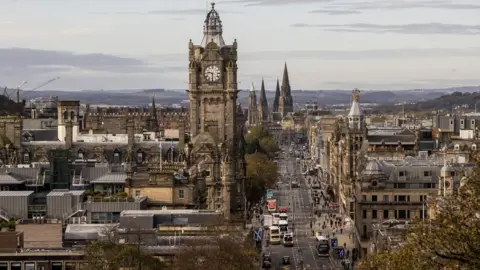 Getty Images
Getty ImagesA licensing scheme for short-term lets could effectively ban small business owners without improving the housing crisis, a group of critics has said.
A judicial review of Edinburgh's implementation of the Scottish government's Short Term Let Licensing legislation is being heard this week.
The landlords taking the city council to court said the new rules would have a "seismic" impact on the capital.
The housing minister said responsible operators had "nothing to worry about".
Scotland's short-term let licensing scheme came into effect in October 2022.
The Scottish government said the scheme was developed in response to residents' concerns about the impact of short-term let properties such as Airbnb rentals on their communities.
Despite claims that the policies could help address housing shortages, homelessness charity Shelter said the scheme was "a drop in the ocean" in Edinburgh, where 38,500 social homes were needed.
But tourism leaders have described Edinburgh's rules as a "de facto ban" on holiday lets for small business owners that were removing "small operators in favour of big business".
Many owners of rental properties in Edinburgh have complained they have not been able meet new requirements for retrospective planning permission for a change of use.
Louise Dickins, from Dickins Homes From Home, is one of four petitioners bringing the crowdfunded Judicial Review against Edinburgh council's scheme.
She said the policies implemented in Edinburgh would have a "disastrous" impact on the city, its festival and responsible businesses.
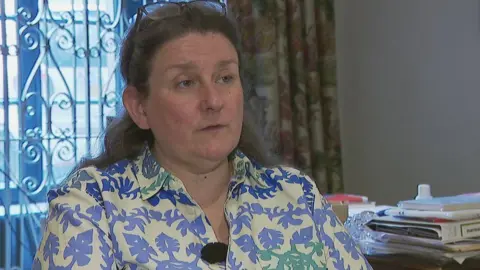
After 25 years dealing with short-term lets in the capital, Ms Dickins said she was only able to take bookings for the 70 properties she manages until October because licences have not yet been granted.
"It is taking out the small operator in favour of big business," she said, describing Edinburgh's rules as the "most heavy-handed" in Scotland.
She said the government had failed to understand the marketplace.
"Our first minister is currently staying in temporary accommodation whilst Bute House is being done up," she said.
"There are all sorts of people who need temporary accommodation - film companies, local families, people who are relocating here, people here doing business for a short time, visiting professors."
Ms Dickins said if those people were not able to stay in self-catering accommodation then "the impact on Edinburgh is going to be enormous."
She added said it was unlikely that many flats on her books would return to the residential sector because most were used by their owners for part of the year.
Ms Dickins explained: "This model works for them. They make it available for certain blocks of time throughout the year. That's not possible with long-term letting.
"All of those homes that I manage that are currently contributing economically to the city will cease to contribute."
Ms Dickins, who takes on extra properties during the summer, said the licensing rules would have an "absolutely seismic" impact on Edinburgh's festivals, when accommodation shortages were already being blamed for pricing out audiences and performers.
She said the application cost alone was putting many people off applying for a licence.
Ms Dickins warned: "Lots of people will close across Scotland - bed and breakfast, little self catering units, guest houses. It will change the landscape of people's ability to holiday in Scotland."
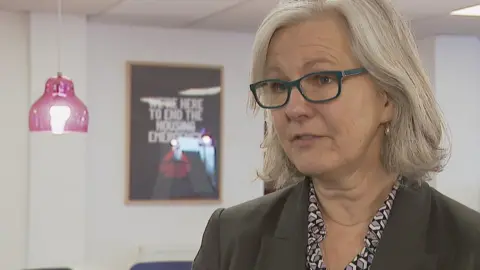
Edinburgh Hotels Association tentatively welcomed a "level playing field" for businesses supplying commercial accommodation.
"We see this as fair and reasonable from a consumer perspective and is no less than is demanded of even small hotel, B&B and guest house operators who must meet obligations under various safety regulations," they said.
But they acknowledged it was a "complex issue" and difficulties faced by those refused a licence, many of whom had been running successful businesses for years, should not be glossed over.
A spokesperson pointed out that accommodation in the city was "simply unaffordable" for many workers and there was "poor availability" of public transport into the city for shift workers living in cheaper towns.
Debbie King, Shelter's head of advocacy, said licensing changes were a "step in the right direction, but a drop in the ocean" when 38,500 new social homes were needed this parliamentary term.
She added: "There's far too many people struggling to find a home in communities where there are high levels of need and also high levels of lets.
"What we want to see is those homes, where possible, brought back into use as permanent homes."
She said the council needed to balance housing need and tourism, and licensing could help reduce the number of short-term lets in busy areas.

'Permission was refused in case the next owner is unscrupulous'
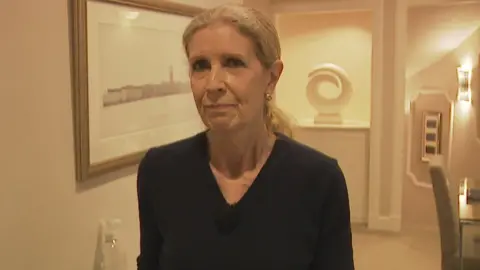
Fiona Johnston set up her rental business after moving to Edinburgh and now uses her two flats as short-term lets.
"I'm very happy for a licence scheme to be introduced, or a registration scheme, as long as it is proportionate and does what it is intended to do," Ms Johnston said.
But she added that she was not sure that was currently the case.
Ms Johnston told BBC Scotland both of her properties had not been able to get licenced.
"They were knocked back on the premise that the planners could not guarantee that unscrupulous people might come in in the future and run them differently," she said.
"So far every single person who has applied for planning permission for retrospective change of use, which is an unusual thing on existing businesses, have all been turned down."
Ms Johnston had hoped to run her business for at least another four or five years, and then use her investment in the mortgaged properties.
"If I don't have licence I have to stop instantly," she said. "It will mean that I won't be able to work. I'm of an age where I won't get a job and this is my pension. Because I have moved around the world I don't have a state pension or a company pension.
"I will look at other ways of using [the flats] perhaps, but at the moment I won't be selling them."

Housing Minister Paul McLennan told BBC Scotland the scheme was about ensuring "best practice" for people providing accommodation.
"I think if they are responsible operators there's nothing to worry about," he said. "It is ensuring standards are the same right across Scotland."
Short-term control areas were up to local authorities to decide if and where to impose them, he added, as "they know their local area better than anyone."
A Scottish government spokesperson said they had already committed to review licensing regulations in 2024.
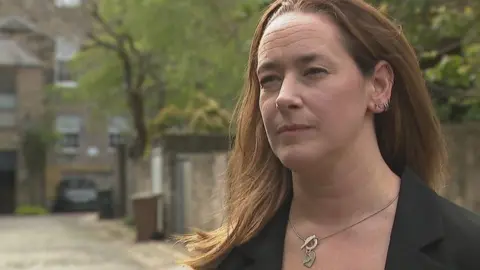
However, Fiona Campbell from the Association of Scotland's Self-Caterers, said the current policy was "badly drafted".
"The policy wasn't clear enough - was it about housing, health and safety, anti-social behaviour?" she said. "It is very difficult to get anybody to say what they are actually trying to achieve.
"This court case is about Edinburgh but the ramifications for the rest of the polices across Scotland may be quite dramatic.
"Our sector is on this like a hawk because it is impacting on everybody's lives and livelihoods just now."
Ms Campbell said Edinburgh was "leading the way in doing it badly", but she was confident the council would not win the case because they were introducing a "de facto ban" on short-term letting.
She said the Isle of Skye had already lost 22% of holiday accommodation as a result of licences, leading to "more people with second homes and more people in camper vans".
Ms Campbell added: "It does not help the local economies."
A City of Edinburgh Council spokesperson said they would not comment on the live legal action.
